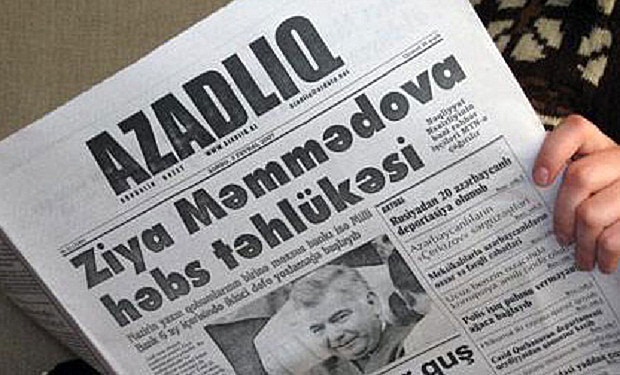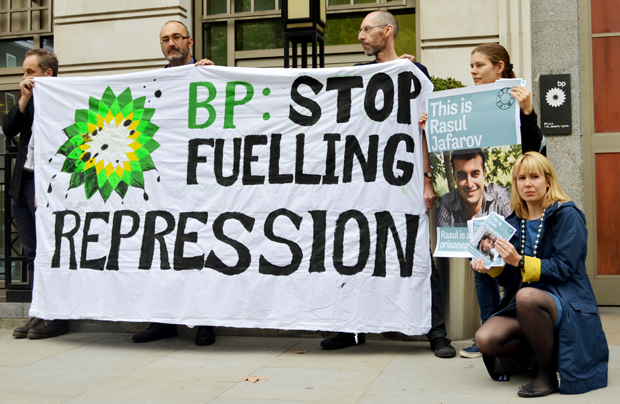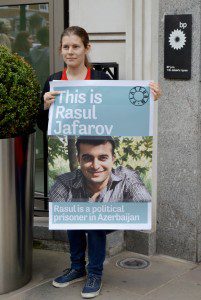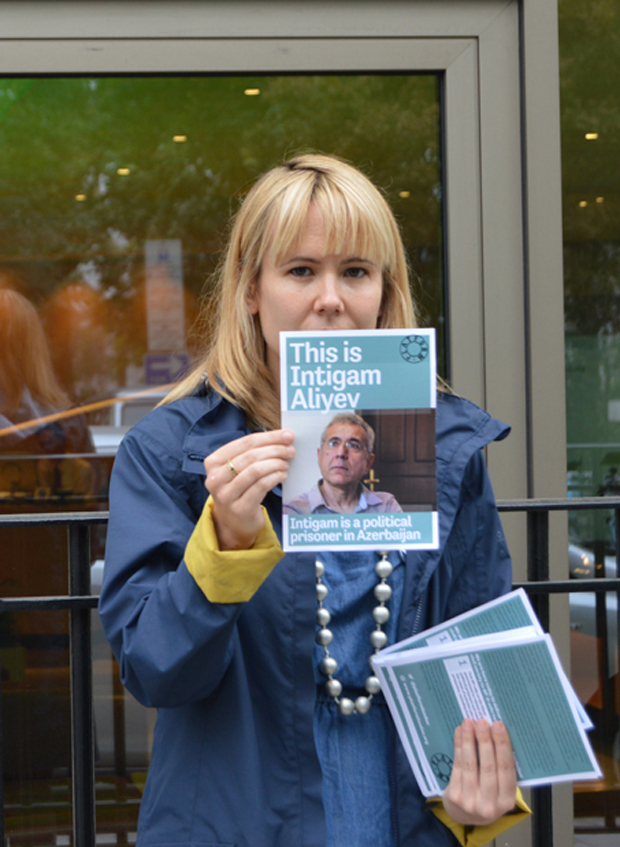20 Sep 2014 | Azerbaijan, Azerbaijan Letters

Rasul Jafarov, Arif Yunus and Leyla Yunus (Photos: Rasul Jafarov (© IRFS), Arif and Leyla Yunus (© HRHN))
Azerbaijanis are demanding that BP stop supporting repression in their country on the 20th anniversary of the Contract of the Century.
A letter has been sent to BP CEO Bob Dudley to coincide with today’s 20 year anniversary. On 20 September 1994 BP signed a contract with then president Heydar Aliyev to extract Azerbaijani oil. This initiated the oil company’s two-decade relationship with Azerbaijan, providing money and power to Aliyev, which the letter argues, has hindered democracy in the country.
Mirvari Gahramanli, The Oil Workers Right Protection Organisation Union says: “BP is where the president got his power from. What is he without the money? Where is his wealth, where are his police, without BP’s money? The Aliyevs have grown rich from BP and now as a result they have much more power.”
The letter is asking BP to call on the Aliyev government to release all 98 political prisoners currently being detained, and to especially raise the cases of the most recent arrests; Leyla and Arif Yunus, Intigam Aliyev and Rasul Jafarov – who has managed to sign the letter from prison. It also asks that BP remove its sponsorship from the 2015 Baku European Olympic games.
Protesters gathered outside the London headquarters of BP on Wednesday, ahead of today’s anniversary; Azerbaijanis are unable to protest at BP’s offices in Baku as the current level of repression means that taking part in a demonstration could lead to a jail sentence.
Emma Hughes, Platform London says: “We took action this week because Azerbaijani’s are unable to. I am free to stand outside BP – in Azerbaijan such an action would mean arrest. BP are propping up the Aliyev regime. If they are serious about supporting democracy in Azerbaijan they must talk about the country’s 98 political prisoners and end their sponsorship of the 2015 Baku Olympics.”
This article was posted on 20 September 2014 at indexoncensorship.org
17 Sep 2014 | Azerbaijan, Azerbaijan News, News and features, United Kingdom

London-based daily newspaper Metro ran a feature this month extolling the delights of Baku, the capital of Azerbaijan. The photo-driven feature article comes at a time when the government of President Ilham Aliyev is ratcheting up pressure on dissenters, including denying independent news outlets the kind of freedoms that a paper such as Metro, whose parent company is outspoken on the importance of press freedoms, enjoys in the UK.
Despite attempts to present itself to the outside world as a modern and open society — in part through a concerted international PR campaign — Azerbaijan has a woeful human rights record and continues to arrest, detain and harass any opponents to the regime of President Ilham Aliyev. In the last few months, many campaigners and activists have been arrested in an attempt to silence them.
Metro highlighted 10 things to do in Baku. Here we list just five things you need to know about Azerbaijan before you go. We ask our supporters and all those who care about a free press and free expression to draw attention to these so we can counter the whitewash of the Aliyev regime.
There is an ongoing crackdown on government critics

A number of high profile Azerbaijanis known for their criticism of authorities have been jailed in a matter of weeks. These include human rights activists Leyla and Arif Yunus and Rasul Jafarov, human rights lawyer Intigam Aliyev and journalist Seymur Hezi. This new wave of repression followed the jailing of two human rights defenders who lead the only independent group monitoring elections in Azerbaijan.
Independent media is silenced

Azerbaijan’s last independent newspaper Azadliq, which was named 2013 Guardian Journalism award winner at the Index Freedom of Expression awards in March 2014, was forced to suspend printing in July because of financial pressures from the government. This is a familiar pattern for Azerbaijan’s critical press, which has long been subjected to an array of attacks. Independent news outlets face economic sanctions and are often barred from distribution networks. Journalists are also victim to legal threats. In the first six months of 2013, 36 defamation suits were brought against media outlets or journalists. Award-winning investigative journalist Khadija Ismayilova was subjected to an aggressive smear and blackmail campaign in retaliation for her coverage of government corruption and continues to be targeted by authorities.
Internet users are targeted
Ahead of last year’s election Azerbaijan extended penalties for criminal defamation and insult to cover not just traditional media, but also online content, including social networks. The potential length of pre-trial detention has increased from 15 to 90 days. In May, a university student and member of the Free Youth organisation, was arrested for a Harlem Shake video posted on YouTube. A human rights defender was sentenced to four years in jail on hooliganism charges after posting videos on YouTube containing interviews with victims of a gang they alleged had connections to local police officers. A freelance journalist who was outspoken in his criticism of the government on social media was given a four-and-a-half-year prison sentence on charges that included appealing for mass disorder.
Artists are censored
Despite the fact that Azerbaijan has committed to respect and protect artistic freedom of expression, authorities restrict this right. This is especially the case for alternative artists and those deemed to be critical of the government, whose ability to perform, display, or disseminate their work is limited. Self-censorship is one consequence of this, with many artists shying away from producing critical or controversial work for fear of the possible consequences. Musician Jamal Ali, who has spoken out against President Aliyev, was allegedly tortured by the police.
Democratic principles are ignored

Current president Aliyev has been in power since 2003, when he took over from his father Heydar, and in 2009 he removed term limits for the presidency. According to the international observer mission, the October 2013 election “was undermined by limitations on the freedoms of expression, assembly and association”, with “significant problems” observed throughout election day. The 2003 and 2008 votes also failed to meet international standards. Transparency International has called Aliyev’s government the most corrupt in Europe. Meanwhile, authorities have engaged in a wide-reaching international PR campaign. In 2012, the country was given a chance to project a positive image to the world through hosting the Eurovision Song Contents. Preparations included urban renewal programs that saw homes demolished and families evicted. It remains to be seen what will happen next year, when the inaugural European Games come to Baku.
This article was published on Wednesday 17 Sept 2014 at indexoncensorship.org
17 Sep 2014 | Azerbaijan, Azerbaijan News

Protest outside BP HQ in London (Photo: Dave Coscia)
Protesters called on global oil giant BP to reassess its connections with the regime in Azerbaijan at a gathering outside the company’s London headquarters.
This week marks the anniversary of the signing of the Contract of the Century, when BP began its 20 year relationship with the Aliyev family. The protesters argue that BP’s role in Azerbaijan has provided the former president, Heydar Aliyev, and the current president, his son Ilham, with considerable power and money, facilitating the country’s repressive regime and hampering democracy.

Claire James – Campaign against Climate Change (Photo: Dave Coscia)
There are currently 98 political prisoners being held in Azerbaijan and the threat of arrest others is also high. Recently, prominent activists Leyla and Arif Yunus and Rasul Jafarov have been jailed, as well as human rights lawyer Intigam Aliyev.
Ramute Remezaite, a human rights lawyer who worked in Azerbaijan, told Index on Censorship: “It’s very important to tell BP that it is totally intolerable to cooperate with the government of Azerbaijan, it’s repressing its own people and putting them to prison for reasons such as exercising their fundamental human rights.

Ramute Remezaite – Human rights lawyer (Photo: Dave Coscia)
“Another reason why it’s very important to be here and to hold this action, is as solidarity with our colleagues in Baku because such an action is impossible these days in Azerbaijan — people standing in front of the BP office in Baku would be immediately arrested and sentenced to one, two, three weeks in prison.”
A group of Azerbaijani civil society organisations plan to send a letter to Bob Dudley, group chief executive of BP, demanding that the company call on the Aliyev government to release all political prisoners, and ensure that other prominent human rights defenders, such as Emin Huseynov, will not face arrest.
Emma Hughes from Platform London, who organised today’s protest, told Index: “We’re here today in solidarity with Azerbaijani civil society who are calling on BP to raise the case of the 98 political prisoners in Azerbaijan and also to drop their sponsorship of the 2015 Baku European Olympic Games.”
Also attending the protest, alongside Platform London and Index on Censorship, were representatives from Campaign Against Climate Change, Article 19 and BP or not BP.

Emma Hughes – Platform London (Photo: Dave Coscia)
Claire James, from Campaign Against Climate Change, told Index: “I’m here partly in solidarity with political prisoners but also because our world’s addiction to fossil fuels is overcoming any common sense about what we’re doing to the planet and it should not also be overcoming human rights.”
In conclusion to the letter, Azerbaijani civil society asks that BP ceases its activities in the country until such times as a “democratic and accountable government is in power”.
This article was posted on 17 Sept 2014 at indexoncensorship.org
5 Sep 2014 | Azerbaijan, Azerbaijan News, News and features

Seymur Hezi, a reporter working for Azadliq, Azerbaijan’s last independent newspaper, was sentenced to a two month pretrial detention on Monday, charged with disorderly conduct. This morning, journalist Khadija Ismayilova was detained at the Baku airport, according to the Institute for Reporters’ Freedom and Safety (IRFS).
Hezi’s arrest is another sign of the continuing clampdown by Azerbaijan’s authoritarian government on civil society. The journalist was charged with an alleged attack on a person in the street, although his lawyers claim he was trying to protect himself after he had been harassed and attacked.
It is not the first time charges of hooliganism and disorderly conduct have been applied against opposition politicians, civil society activists and journalists in Azerbaijan. In previous years, the same charges were used to imprison critical journalists Sardar Alibeili and Ganimat Zahid as well as bloggers Emin Milli and Adnan Hajizadeh.
“Seymur Hezi’s arrest is a serious blow against our newspaper. He is one of the brightest Azerbaijani analysts and journalists, and a true intellectual,” Rahim Haciyev, acting editor of Azadliq newspaper, told Index.
Haciyev said he is sure Hezi’s arrest is the result of a planned provocation and the journalist is prosecuted for publishing critical articles on the authorities in the newspaper, as well as in his online TV program “Azerbaijani Hour”, which he scripts and hosts.
The journalist’s arrest came only a month after the newspaper he works for, Azadliq, was forced into suspension of publication due to financial pressure from the authorities. Now it exists only in its online version.
The authorities of Azerbaijan continue their clampdown on the civil society of the country. Well-know human rights defenders Rasul Jafarov, Intigam Aliyev, Leyla Yunus and her husband Arif Yunus are still behind bars after they were all sentenced to 3 months of pretrial detention. The office of the Institute for Reporters’ Freedom and Safety (IRFS) was searched and sealed.
This wave of repression is connected to new legislation in place in Azerbaijan that restricts the freedom of association. In fact the new law makes it illegal for unregistered civil society organisations to receive funds for their activities.
This article was posted on 5 Sept 2014 at indexoncensorship.org








